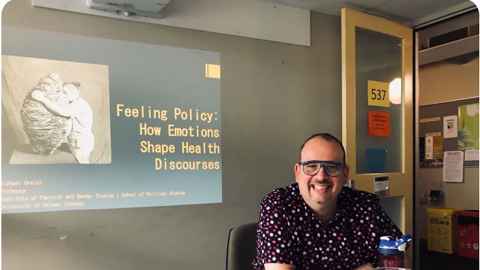How much does kindness matter in politics?
5 March 2020
Green MP and Faculty of Arts alumna Chlöe Swarbrick and Canadian professor Michael Orsini join a public panel discussion on the ways kindness and emotion can work in politics and policy.

Does compassion translate into policy action? Do emotions interfere with rational decision making or enhance it? Is a society which makes kindness the central consideration of governments and the private sector possible, or even desirable?
Green Party MP Chlöe Swarbrick, Professor Michael Orsini from the University of Ottawa, Helen Robinson from the Auckland City Mission and Mark Powell from the Business School will be discussing these questions in an election year panel, Kindness versus shame: Why emotions matter in politics and policy on Monday 9 March in the General Library at the University of Auckland.
Chlöe Swarbrick is the Green Party spokesperson for mental health, drug law reform, education and youth and local government, among other portfolios. She was elected to Parliament in the 2017 general election at the age of 23, the youngest MP for 40 years, and is now a member of the coalition government.
A graduate of the University’s Master of Social and Community Leadership, Helen Robinson is the general manager of social services at the Auckland City Mission and Mark Powell is the former Group CEO of The Warehouse Group and an adjunct professor in the University’s Graduate School of Management.
Chaired by Professor Jennifer Curtin, director of the University’s Public Policy Institute, the event is being co-hosted by the Institute and the Agencies of Kindness Research Hub at the University of Auckland.

Some emotions matter more than others
Professor Michael Orsini, who is cross-appointed in the Institute of Feminist and Gender Studies and the School of Political Studies at the University of Ottawa, is interested in how emotions are managed in policy environments, and how some take precedence over others, depending on the context.
“Some emotions matter more in policy debates than others, at different times," he says. "Emotions might feel spontaneous, but how they are prioritised by political actors can depend on the kind of emotion being expressed. Anger, for instance, might be seen as negative but it can actually be useful politically to get issues on the policy agenda. So the ordering of emotions gives us a window into why some feelings or emotions seem to be legitimised and others are not.”
He believes emotions are absolutely compatible with rational decision making.
“We think with emotion, we reason with emotion. This is something many folks have been at pains to explain, neuroscientists for instance. But for a host of reasons, we are committed to the idea that emotions are the enemy of reason, and I don’t think that is particularly helpful.”
But aren’t voters who make decisions based purely on emotion rather than facts what brought someone like Trump to power, in an era being referred to as ‘post-truth’ or ‘post-factual’ politics?
“Of course, I certainly don’t want to diminish these troubling developments in countries like America, but the history of this era of post-truth owes much to a general distrust and mistrust of expertise and science; it’s not reducible to a focus on emotions per se.”
He mentions a book by a US sociologist named Arlie Hochschild, Strangers in their Own Land, in which she talks about meeting and spending time with Trump supporters to get a window into what drives them, and what explains their unequivocal support for the president even if such support goes against their economic needs.
“She settles on this idea of what she calls a “deep story”, in a nutshell, folks connect with a narrative that feels right to them and which doesn’t have to be concerned with facts. It’s a narrative to which they cling to help them move through the world and I think there is something powerful in this.
“It’s certainly not about legitimising or rationalising forms of hatred or racism. But it does mean that countering hate and division requires a tremendous effort to help others to depart from the narrative that makes sense to them.”
Prime Minister Jacinda Ardern could be seen as proponent of a new form of political leadership which moves away from a combative, winner-takes-all style towards collaboration and kindness. From a Canadian point of view, how does he view that approach?
“That’s a tough one as I’m certainly not an expert on New Zealand politics and don’t want to swoop down from the perch to pronounce on your leader. However from the outside looking in, she has shown tremendous leadership in times of crisis.
“In the wake of the Christchurch massacre, for instance, she took swift, deliberate steps on gun control, and she decried racism and Islamophobia. But I’m also concerned about the gendered expectations of the compassionate leader; when the PM behaves in a way that is not deemed compassionate, is she somehow stepping out of character? This is deeply problematic. Placing particular demands on women leaders to behave in a particular way seems regressive and, well, profoundly sexist.”
Countering hate and division requires a tremendous effort to help others to depart from the narrative that makes sense to them.
However he’s concerned about what can sometimes be a notable gap between appearing to care and not actually taking any positive political action.
“In Canada, for example, we are in the midst of a national crisis in terms of our relationship with Indigenous people and our Prime Minister Justin Trudeau, who began his mandate as a feminist leader, as caring and compassionate, has been anything but compassionate and friendly to Indigenous people, despite his initial appearance.
“So I don’t want to sound overly pessimistic, but simply express some caution about how political leaders can mobilise compassion in the service of advancing political issues.”
Compassion, he says, can also have a dark side, particularly when it’s mobilised in the service of questionable or flawed ideas.
“I’ve been researching ‘obesity’ policy and discovered that these policies make certain assumptions about people who are seen as ‘obese’, a term I use cautiously because activists associated with fat acceptance reject it. Some of the emotions that become attached to people who are labelled ‘obese’ are disgust, shame, anger, and even compassion.
“So I would say that compassion in the field of ‘obesity’ can be problematic because it tends to view fat people as helpless, and in need of support. Compassion in this instance is I believe misplaced, as it imagines the targets of these policies as morally weak.”
Professor Orsini will be looking at some of the contentious narratives that circulate around fatness and obesity, among other policy areas, in a seminar this Friday 6 March.
Kindness versus shame: Why emotions matter in politics and policy, a free panel discussion, is on Monday 9 March at 5.30pm in the General Library, Room B10 at the University of Auckland.
Media contact
Julianne Evans | Media adviser
Mob: 027 562 5868
Email: julianne.evans@auckland.ac.nz